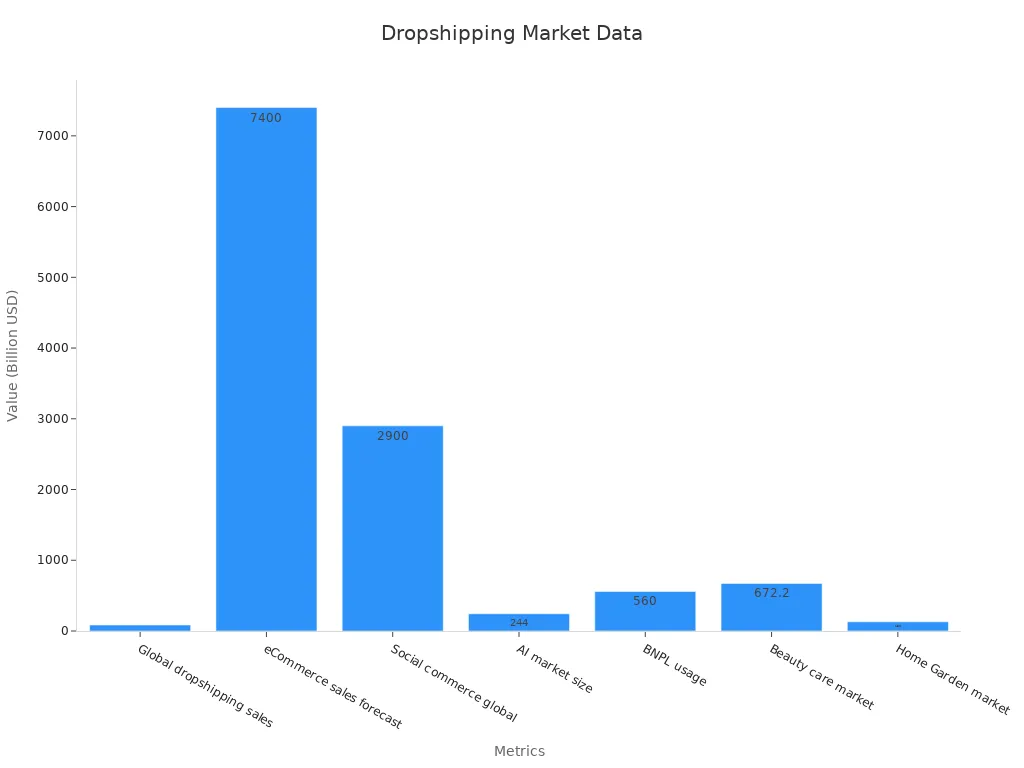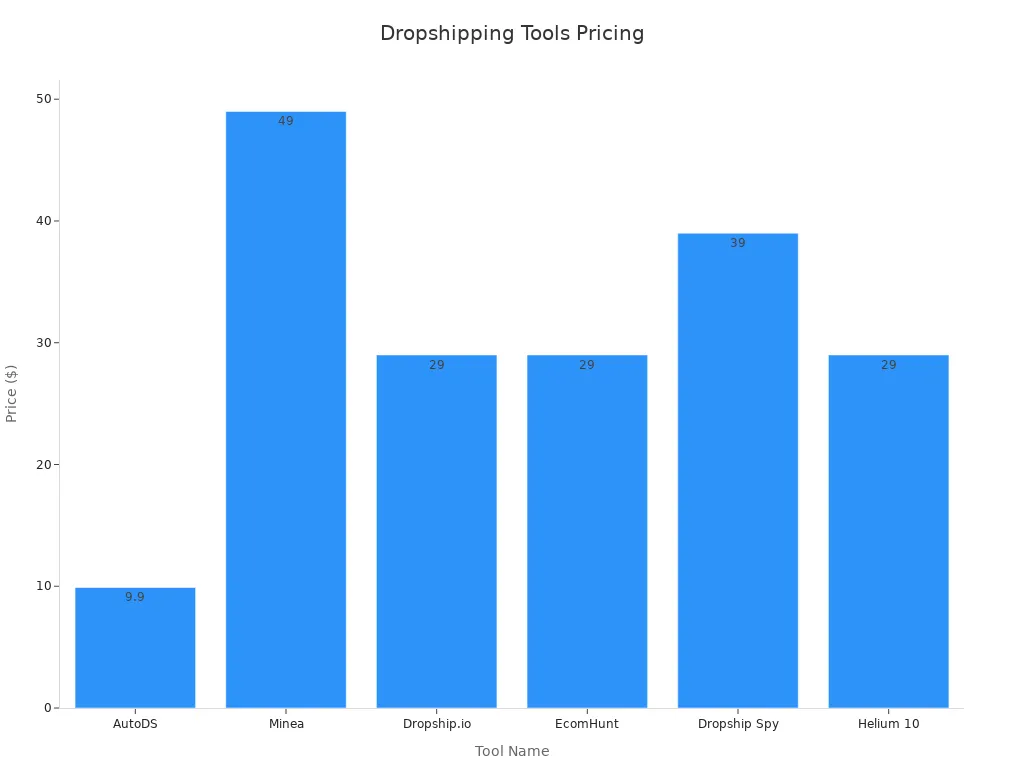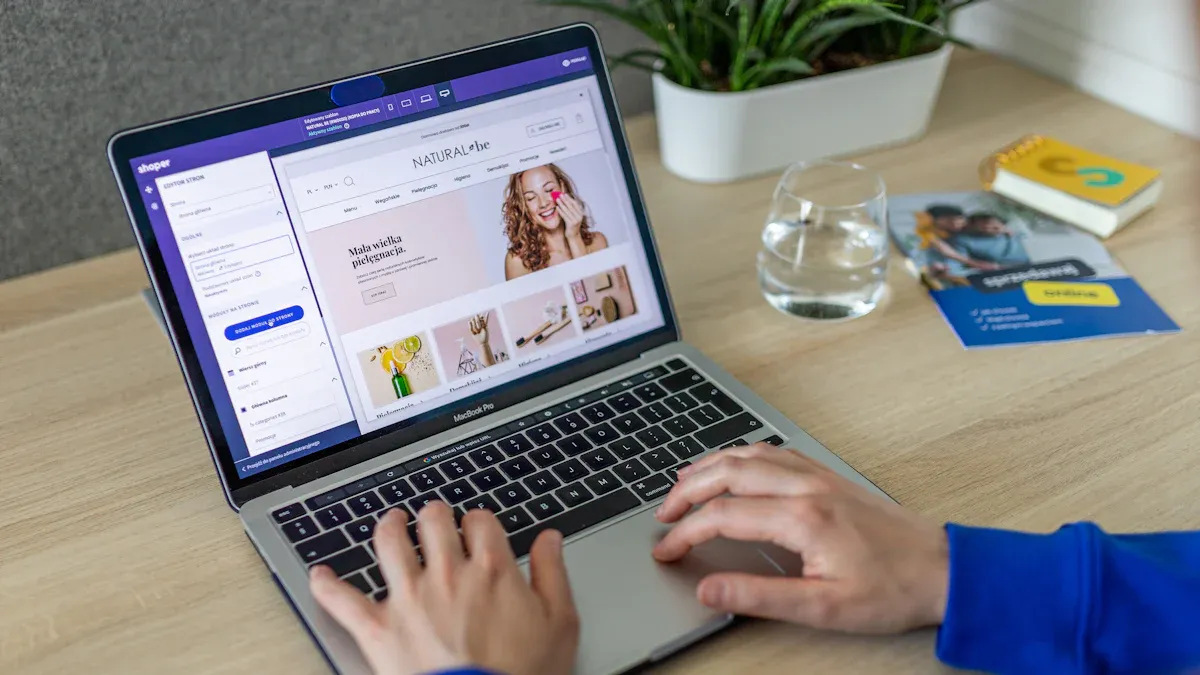Step-by-Step Guide to Launching Your Dropshipping Business in 2025

Ready to make your dropshipping business idea real? Start dropshipping by choosing a niche. Find good suppliers. Set up your store. Plan smart marketing. Dropshipping is getting bigger every year. Global sales may reach $85 billion. In 2025, 23% of online sales may come from dropshipping.

You do not need a lot of money or a warehouse. Dropshipping lets you try new products fast. You can change your store quickly. But there is a lot of competition. Only about 10% to 20% of people succeed in dropshipping. Stay curious and watch for new trends. Keep your business plan strong. If you want a flexible job, this guide can help you start.
Benefit or Challenge | Data/Facts |
|---|---|
Low investment needed | No inventory or warehousing required |
Growing market | |
High competition | 27% of e-commerce sites use dropshipping |
Success rate | 10% to 20% |
Profit margins | 20% to 40% possible for niche stores |
Key Takeaways
Dropshipping helps you open an online store with little money. You do not need to keep products in stock.
Picking a good niche and trusted suppliers is very important. This helps you be different and make more money.
Use product research tools to see what people want. Test your products to help you sell more.
Make your store on simple sites like Shopify. Set up safe ways for people to pay so they trust you.
Tell people about your business on social media and with influencers. Use paid ads to get more customers and help your business grow.
Is Dropshipping Business Right for You?
Understand the Model
Dropshipping lets you sell products online without keeping them in stock. When a customer buys from your store, you order the item from a supplier. The supplier ships it straight to your customer. You never touch the product. This makes the dropshipping business model easy to start and manage from anywhere.
Many people use tools like Sell The Trend, AliExpress Dropshipping Center, and Niche Scraper. These tools help you find trending products, check sales data, and see what your competitors are doing. Social media platforms like TikTok and Instagram also play a big role. Over half of TikTok users say the app influences what they buy. You can use these platforms to spot trends and connect with customers.
Tip: If you love learning about new products and enjoy social media, you might enjoy running a dropshipping business.
Here’s a quick look at how dropshipping works today:
Step | What Happens |
|---|---|
Customer orders | You get an order in your online store. |
You buy from supplier | You buy the product from your supplier at a lower price. |
Supplier ships | The supplier ships the product directly to your customer. |
You earn profit | You keep the difference between your selling price and the supplier’s price. |
Pros and Cons
Every business has ups and downs. Dropshipping is no different. Let’s break it down:
Pros:
You need little money to start.
The dropshipping business model is flexible. You can work from anywhere.
The market is growing fast. Experts say it could reach $1,253 billion by 2030.
About 27% of online retailers use dropshipping.
Cons:
Finding good suppliers is tough. 84% of online sellers say this is a big problem.
Profit margins are usually 15% to 20%.
Customers want fast shipping and free delivery. Meeting these needs can be hard.
Competition is strong. Over 5 million Shopify stores exist in 2025.
Remember, dropshipping can be a great way to start your own business, but you need passion, planning, and grit to succeed.
Essential Steps to Start Dropshipping
Starting a dropshipping business in 2025 means following a clear path. You need to plan, research, and stay committed. Let’s break down the essential steps you need to take to build a successful dropshipping business.
Choose a Niche
Picking the right dropshipping niche is your first big decision. You want to find your niche where demand is steady, competition is manageable, and profits are strong. Many people look for trending products, but you should also think about what interests you. If you enjoy your products, you will market them better.
Profitable niches often have:
Consistent market demand
Manageable competition
High-profit margins
Emerging trends shape what sells. In 2025, people care more about sustainability, health, and new tech. You might see eco-friendly products, smart home devices, fitness gear, and pet supplies become popular. High-ticket items in health and wellness or smart home tech can bring bigger profits.
Tip: Use tools like Google Trends, SEMrush, and Statista to research a niche. These tools show you what people search for and how interest changes over time.
If you want to start dropshipping, always keep an eye on market research. This helps you spot new trends and adjust your store quickly.
Research Competitors
Once you find your niche, you need to know who else is selling similar products. Researching competitors helps you see what works and what doesn’t. You can learn from their strengths and spot their weaknesses.
You should also check:
SEO tools to see which keywords your competitors rank for.
Social media monitoring tools to track engagement, hashtags, and brand mentions.
Customer feedback platforms like SurveyMonkey to learn what buyers like or dislike.
Note: Good market research lets you find gaps in the market. You can offer something unique or improve on what others do.
Here’s a quick table to help you compare competitor research tools:
Tool | What It Does | Why Use It? |
|---|---|---|
Dropship.io | Tracks stores, products, and trends | Find winning products |
Thieve.co | Curates trending AliExpress products | Get product ideas fast |
Google Trends | Shows search interest over time and regions | Validate demand and timing |
SEMrush | Analyzes SEO and keywords | Improve your store’s ranking |
When you research competitors, you learn how to stand out. You can also spot new opportunities before others do.
Develop a Business Plan
A strong business plan is your roadmap. It helps you set goals, plan your budget, and prepare for challenges. If you want to attract investors or partners, a detailed plan shows you know your stuff.
Your business plan should include:
Your business vision and mission
Market research and analysis
A clear description of your target audience
Competitor analysis
Marketing and sales strategies
Financial projections and funding needs
Market research shows that dropshipping is growing fast. Experts expect the market to pass $500 billion by 2025. Automation, mobile shopping, and social media marketing are changing how people shop. You need to plan for these trends.
Tip: Use real sales data and competitor research to make your financial forecasts. This helps you set realistic goals and spot risks early.
A good business plan helps you:
Make better decisions
Prepare for risks
Stay focused on your goals
Attract funding if you need it
If you want to start dropshipping, take time to write a solid plan. This step sets you up for long-term success.
🚀 Starting a dropshipping business takes effort, but each step brings you closer to your goals. Stay curious, keep learning, and always use market research to guide your choices.
Find Reliable Suppliers

Picking the right dropshipping supplier is very important. Good suppliers help you send quality products on time. This keeps your customers happy and helps your brand grow. Bad suppliers can cause late shipping and poor products. You might get bad reviews if this happens. Try to avoid these problems from the start.
Where to Search
There are many ways to find a dropshipping supplier. Some websites and lists help you find trusted partners. Here are some popular places to look:
Spocket: Helps you find suppliers in the US and Europe for faster shipping.
AliExpress: Has many products, but shipping can take longer.
SaleHoo: Gives you a list of checked suppliers and business tools.
Doba: Connects to your store and helps with order processing.
Worldwide Brands: Lists certified suppliers and learning resources.
CJ Dropshipping: Has warehouses around the world and branding options.
Modalyst: Shows trending brands and updates inventory automatically.
Veridion: Uses AI to check millions of companies and supplier data.
Tip: Even if a list says a dropshipping supplier is checked, always do your own research. Paid lists often have the newest information.
You can also try MegaGoods, Sunrise Wholesale, and Inventory Source. Each one has different features. Try a few to see which one works best for you.
Evaluate Suppliers
Pick a supplier who meets your needs. Do not choose the first one you find. Take time to check their quality, trust, and service. Here is a table to help you compare what matters:
Criteria | What to Look For |
|---|---|
Price Competitiveness | Check prices to get good value and keep quality. |
Delivery Reliability | Make sure they ship on time and give tracking. |
Quality Control | Ask for samples and look for certifications like ISO 9001. |
Customer Support | See how fast and helpful their support team is. |
Scalability | Make sure they can handle more orders as your dropshipping business grows. |
Return Policies | Check their return and refund rules. |
Read reviews and ratings on trusted websites. Order samples to check product quality and shipping speed. Good communication is very important. If a dropshipping supplier answers your questions fast and clearly, that is a good sign.
Having a good relationship with your dropshipping supplier helps you fix problems quickly and keeps your business running well.
If you want less risk, use more than one supplier. This gives you more options and helps you avoid delays if one supplier has problems. When you pick a supplier, always set clear rules about quality and delivery times.
Select Products
Picking the right dropshipping products is very important. The products you choose can help your store do well or not. You should pick products that people want to buy. Make sure the prices are good. Try to find items that are different from what others sell. You can use smart tools and testing to help you find the best products for your dropshipping business.
Product Research Tools
You do not have to guess what will sell. Product research tools can help you see what is popular. These tools show you trends, prices, and what is selling now. You can also see real sales numbers and customer reviews. Some tools even show what your competitors are selling. For example, Sell The Trend’s Product Order Statistics gives you sales speed and seasonal trends. It also shows which groups of people buy certain items. This helps you avoid picking dropshipping products that everyone already sells. You can find special items that are not easy to find.
Here is a quick table of some top product research tools and what they do:
Tool Name | Starting Price | Key Features |
|---|---|---|
AutoDS | $9.90/month | Winning Products Hub, sales tracking, price monitoring, AI product descriptions |
Minea | $49/month | Facebook Ads data, influencer tracking, competitor ad analysis |
Dropship.io | $29/month | Product database, real-time revenue tracking, ad spy tools |
EcomHunt | $29/month | Daily updated winning products, historical data, centralized research hub |
Dropship Spy | $39/month | Social proof, AliExpress analysis, profit calculator, live sales tracking |
Helium 10 | $29/month | Product and keyword research, analytics, listing optimization |

You can also use Google Trends and Amazon Best Sellers. Social media like TikTok can help you spot viral dropshipping products. These tools make it easier and faster to do product research. You can pick products with more confidence.
You can also try Tangbuy B2B service for free if you want to ship products directly from source manufacturers.
Tip: Always check prices and reviews before adding new items. This helps you avoid bad products and keeps your customers happy.
Test and Optimize
After you pick your products, do not just wait for sales. You need to test and improve your dropshipping products. Start by ordering samples to check quality and shipping speed. Run small ads on Facebook or Instagram. See which items get the most clicks and sales. Try A/B testing with different pictures, prices, and product descriptions.
Watch these important numbers:
Click-Through Rate (CTR): Shows if people like your product listing.
Conversion Rate: Tells you how many visitors actually buy.
Return on Ad Spend (ROAS): Measures if your ads make more money than they cost.
Customer reviews: Give you real feedback on what people love or dislike.
If a product sells well and gets good reviews, spend more on ads and promote it more. If a product does not sell, try changing the price or description. You can also replace it with a new item. By checking your results and listening to your customers, you can help your dropshipping business grow and make more money.
Note: Testing and improving your dropshipping products helps you save money and find the best items for your store.
Build Your Online Store

Choose a Platform
You need a good base for your dropshipping website. Picking the right platform makes things easier. Many people use Shopify, WooCommerce, or BigCommerce. These platforms help you build an ecommerce store fast. You do not need to know how to code. Shopify is popular because you can test products and run ads. It also helps you grow your store quickly. Jacky Chou and Albert Liu used Shopify for their home decor dropshipping store. They went from losing money to making $250,000 a month. They did this by researching products, building their brand, and using smart ads.
Some sellers use WooCommerce or BigCommerce for their ecommerce store. These platforms work well with tools like Oberlo, Spocket, and AliDropship. You can add products, manage orders, and track inventory easily. Many people say starting with a simple platform helps you focus on branding and marketing. You do not have to worry about tech problems.
Tip: If your brand looks the same everywhere, you can make more money. Shoppers trust brands, especially when they cannot see the products.
Here’s a quick table to help you compare popular ecommerce platforms:
Platform | Best For | Key Features |
|---|---|---|
Shopify | Beginners, scaling | Easy setup, app store, automation |
WooCommerce | Customization, WordPress users | Flexible, open-source, plugins |
BigCommerce | Growing businesses | Built-in features, scalability |
When you build your store, pick a platform that works with dropshipping tools. Look for easy ways to add marketing apps. This saves you time and helps your store grow.
Set Up Payment Gateways
Now you need to let customers pay you safely. Setting up payment gateways is very important. Most shoppers want to use debit or credit cards. Pick gateways that let people pay this way and keep payments safe. Shopify Payments, PayPal, and Stripe are good choices for a dropshipping store.
Safe payment gateways protect your customers’ information. This helps people trust your online store. When you build an ecommerce store, check that your payment system is safe. Customers want to know their money and data are protected.
Note: Most shoppers care about customer service. Offer live chat, email, or phone support to help with payment questions.
You can set up payment gateways in a few steps: 1. Pick your payment provider in your store dashboard. 2. Add your business and bank details. 3. Test the checkout to make sure it works.
If your store has safe payments and good support, you stand out. Happy customers will come back and tell their friends.
Register and Set Up Finances
Legal Requirements
You want your dropshipping business to work well. First, make it official. Pick the right legal structure for your business. Many people pick an LLC for more protection. You can also start as a sole proprietor. Each choice has its own tax and liability rules.
Here’s a simple checklist to help you start:
Pick your business structure (LLC, Sole Proprietorship, or Corporation).
Choose a special business name and check if it is free.
Register your business with your state or local office.
Get an Employer Identification Number (EIN) from the IRS.
Open a business bank account to keep your money sorted.
Get any licenses or permits your state or city needs.
Set up safe payment gateways for your online store.
Write clear terms of service and return policies for your website.
Tip: Always keep your business money and personal money apart. This makes taxes and bookkeeping much easier.
You must follow some important rules. Collect sales tax when you need to. Use automation tools to help with this step. Protect your customers’ data by using safe payment systems. Do not sell products that break copyright or trademark laws. If you sell branded items, get permission from the brand owner.
Here’s a quick table to help you remember key legal areas:
Legal Area | What You Need to Do |
|---|---|
Business Registration | Register with local offices and get licenses |
Tax Compliance | Collect and pay sales tax, file income tax |
Product Safety | Make sure products meet safety rules |
Data Protection | Use safe payment gateways and protect customer info |
Supplier Contracts | Sign clear agreements with your suppliers |
Manage Taxes
Taxes can seem hard, but you can handle them. Keep good records of every sale and expense. Use accounting software to track your money. This helps you stay ready for tax time.
You need to know about sales tax, income tax, and sometimes VAT or GST if you sell to other countries. In the U.S., sales tax rules are different in each state. Some states want you to collect tax if you have a “nexus” there, like a warehouse or lots of sales. For international sales, you may need to register for VAT or GST.
Keep all receipts and invoices.
File your taxes on time to avoid fines.
Use automated tools to collect and pay sales tax.
Ask a tax professional if you feel unsure.
Note: Good tax planning saves you money and keeps your business safe from fines.
If you sell in many places, you might use different currencies. Some accounting tools help you with this. Always check the latest rules in your area. Laws can change, so staying updated helps you avoid problems.
Market Your Dropshipping Business
You have your store ready. Now you need to market your dropshipping business so people can find you and buy from you. Good marketing helps you stand out and grow a successful dropshipping business. Let’s look at the best ways to get your store noticed.
Social Media & Influencers
Social media is a great place to start. Platforms like Instagram, TikTok, and Facebook help you reach lots of people fast. You can post photos, videos, and stories about your products. Try to show how your products solve problems or make life better. People love to see real stories and fun content.
Working with influencers can boost your dropshipping business. Influencers already have followers who trust them. If they talk about your products, more people will want to try them. Start with small influencers if you have a tight budget. Ask them to share honest reviews or unboxing videos.
Use Facebook and Instagram to build brand awareness.
Post often and reply to comments to keep people engaged.
Track likes, shares, and comments to see what works best.
Try giveaways or contests to get more followers.
Tip: Use tools like Facebook Insights to check which posts get the most attention. This helps you improve your content and reach more people.
Paid Ads & SEO
Paid ads help you reach the right people fast. You can use Facebook Ads, Instagram Ads, or Google Ads. These platforms let you target people by age, interests, and location. Start with a small budget and test different ads. See which ones bring the most visitors and sales.
SEO, or search engine optimization, helps people find your store on Google. Use keyword research tools like SEMrush or Google Keyword Planner. Pick words that people search for but do not have too much competition. Write helpful blog posts and product descriptions using these keywords.
Make sure your website loads fast and works on phones.
Add high-quality photos and clear product details.
Build links from other trusted websites to your store.
Use Google Analytics to track where your visitors come from and what they do.
Note: Always test different marketing channels. Track your results with analytics tools. This helps you spend money wisely and grow a successful dropshipping business.
Manage Orders and Service
Order Fulfillment
You want your customers to get their orders fast. You also want orders to be correct. Order fulfillment is a key part of your dropshipping business. When someone buys from your store, you send the order to your supplier. The supplier packs and ships the product to your customer. You do not need to keep any stock at home.
Here’s a table of important things to watch:
KPI Name | What It Means | How to Improve |
|---|---|---|
Order Fulfillment Time | Time from order to shipment | Use fast suppliers, automate orders |
Shipping Time to Customer | Time from shipment to delivery | Pick closer suppliers, offer options |
Order Accuracy Rate | Orders shipped without mistakes | Use automation, check supplier quality |
On-time Delivery Rate | Orders delivered on time | Track supplier and courier data |
Tip: Always check your supplier’s stock and shipping times. Real-time tracking helps you stop delays and keep customers happy.
Customer Support
Good customer support keeps people coming back to your store. In dropshipping, you do not control shipping or inventory. You need to fix problems fast. Customers want quick answers and clear help if something goes wrong.
You can use chatbots or software like Zendesk to reply fast. AI chatbots answer easy questions right away. This helps stop people from leaving their carts. Make sure your return and refund rules are easy to find. Most stores let people return items for 14 to 30 days. If something is missing or broken, ask for a photo. Then contact your supplier and offer a replacement or refund.
Here are some ways to make your support better: - Set up FAQs and order tracking so customers can help themselves. - Train your team to listen and solve problems kindly. - Use surveys and reviews to find problems early. - Tell customers about any delays before they ask. - Make VIP programs for loyal buyers.
Note: Fast and friendly support builds trust. It helps your brand stand out. Happy customers will buy again and tell their friends.
Scale Your Dropshipping Business
Track Metrics
If you want to grow your dropshipping business, you need to track your numbers. Metrics help you see what works and what needs fixing. You can use dashboards or simple spreadsheets to watch your progress. Many store owners use tools that connect to their website, social media, and even their suppliers. These tools show you real-time data and send alerts if something changes.
Here are some key metrics you should watch:
Sales Metrics: Check your conversion rate, average order value, and revenue per user.
Customer Metrics: Look at customer lifetime value, net promoter score, and how many customers come back.
Operational Metrics: Track how fast you fulfill orders, how accurate they are, and how quickly you turn over inventory.
Financial Metrics: Watch your profit margin, return on investment, and cash flow.
Tip: Automation tools like InventorySource can help you track these numbers and spot trends fast. When you use data to make decisions, you can fix problems before they grow.
The dropshipping market keeps growing. Experts say it could reach $476 billion by 2026. Many businesses fail because they do not track their numbers or use the right strategies. If you want to beat the odds, keep your eyes on your metrics and adjust your plan as you go.
Expand Products
Scaling up means adding new products and reaching more customers. You can use research tools like Google Trends or SEMrush to find what people want. Social media and best-seller lists also give you clues about hot products. When you add new items, check that your suppliers are reliable and can deliver on time.
Here’s a table with tips and real-world results:
Aspect | Details |
|---|---|
Cost Savings | Kenneth Cole cut costs by 90% using automated platforms for product expansion. |
New Niches | Use keyword tools and competitor analysis to spot trends. |
Supplier Benefits | Work with more suppliers to keep stock full and offer more choices. |
Fulfillment | Manage many warehouses with one system to keep shipping fast. |
You can also follow these steps:
Research trends and check what your competitors sell.
Pick suppliers with good reviews and fast shipping.
Make your store easy to use on phones and computers.
Use customer feedback to improve your product list.
Build a strong brand story that people remember.
Note: When you use automation and data, you can grow your store without losing quality. Keep testing new products and watch your numbers to see what works best.
You can start your dropshipping journey by following a clear path. Here’s a quick roadmap for dropshipping success:
Spot trends and understand what people want.
Pick products using smart tools and real data.
Test ideas, learn from mistakes, and keep improving.
Stand out with creative marketing and strong branding.
Use platforms like Shopify and WooCommerce to grow fast.
FAQ
What is the minimum investment to start dropshipping?
You can start dropshipping with as little as $100 to $500. This covers your store setup, basic ads, and product testing. You do not need to buy inventory upfront.
How fast can you make money with dropshipping?
Some people see sales in the first month. Most need a few months to learn, test products, and improve their store. Stay patient and keep trying new ideas.
Do you need a business license for dropshipping?
Most places want you to register your business. You should check your local rules. A business license helps you look professional and keeps you safe with taxes.
Can you run a dropshipping business from anywhere?
Yes! You only need a laptop and internet. You can manage your store, talk to suppliers, and help customers from any place in the world.

TangBuy: A Smarter Way to Dropship in 2025
If you're looking to stay competitive with dropshipping in 2025, speed and trend-awareness are key. TangBuy helps you stay ahead with real-time product trends, fast fulfilment, and factory-direct sourcing. With over 1 million ready-to-ship items, 24-hour order processing, and seamless Shopify integration, TangBuy makes it easier to test, scale, and succeed in today's fast-moving eCommerce landscape.
See Also
Profitable Dropshipping Concepts To Try In The Year 2025
Five Effective Ways To Find Trending Items For Your Store
Top 25 Affordable High-Margin Products To Grow Your Business
Hot Selling Items To Maximize Earnings In 2025 Today
Five Key Advantages Of Dropshipping Pet Toys With Quick Delivery
